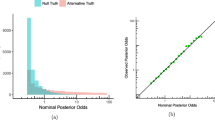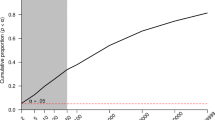Abstract
Disputes between advocates of Bayesians and more orthodox approaches to statistical inference presuppose that Bayesians must regard must regard stopping rules, which play an important role in orthodox statistical methods, as evidentially irrelevant.In this essay, I show that this is not the case and that the stopping rule is evidentially relevant given some Bayesian confirmation measures that have been seriously proposed. However, I show that accepting a confirmation measure of this sort comes at the cost of rejecting two useful ancillaryBayesian principles.
Similar content being viewed by others
REFERENCES
Backe, A.: 1999,‘The Likelihood Principle and the Reliability of Experiments’ Philosophy of Science 66, S354-S361.
Berger, J. and R. Wolpert: 1988, The Likelihood Principle, 2nd ed, Institute of Mathematical Statistics, Hayward, CA.
Birnbaum, A.: 1962,‘On the Foundations of Statistical Inference’ Journal of the American Statistical Association 57, 269–326.
Carnap, R.: 1962, Logical Foundations of Probability, University of Chicago Press, Chicago.
Edwards, A.: 1984, Likelihood, Cambridge University Press, New York.
Edwards, W., H. Lindman, and L. Savage: 1963,‘Bayesian Statistical Inference for Psychological Research’ Psychological Review 70, 193–242.
Fitelson, Branden: 1999,‘The Plurality of Bayesian Measures of Confirmation and the Problem of Measure Sensitivity’ Philosophy of Science 66, S362-S378.
Fitelson, Branden: 2001,‘A Bayesian Account of Independent Evidence with Applications’ Philosophy of Science 68, S123-S140.
Horwich, P.: 1982, Probability and Evidence, Cambridge University Press, Cambridge.
Howson, Colin: 1997,‘A Logic of Induction’ Philosophy of Science 64, 268–290.
Howson, C. and Urbach, P.: 1993, Scientific Reasoning: the Bayesian Approach, 2nd edn, Open Court, La Salle, IL.
Kadane, J., M. Schervish, and T. Seidenfeld: 1996a,‘When Several Bayesians Agree That There Will Be No Reasoning to a Foregone Conclusion’ Philosophy of Science 63, S281-S289.
Kadane, J., M. Schervish, and T. Seidenfeld: 1996b,‘Reasoning to a Foregone Conclusion’ Journal of the American Statistical Association 91, 1228–1235.
Kyburg, H.: 1974, The Logical Foundations of Statistical Inference, Dordrecht: D. Reidel Publishing Co.
Maher, P.: 1988,‘Prediction, Accommodation, and the Logic of Discovery’ in A. Fine and J. Leplin (eds.) PSA 1988, Vol. 1, Philosophy of Science Association, East Lansing, MI, pp. 273–285.
Maher, P.: 1993, Betting on Theories, Cambridge University Press, Cambridge.
Maher, P.: 1996,‘Subjective and Objective Confirmation’ Philosophy of Science 63, 149–174.
Maher, P.: 1999,‘Inductive Logic and the Ravens Paradox’ Philosophy of Science 66, 50–70.
Mayo, D: 1996, Error and the Growth of Experimental Knowledge, Chicago University Press, Chicago IL.
Milne, P.: 1996,‘log[p(h/eb)/p(h/b)] is the One True Measure of Confirmation’ Philosophy of Science 63, 21–26.
Mortimer, H.: 1988, The Logic of Induction, Prentice Hall, Paramus.
Nozick, R.: 1981, Philosophical Explanations, Harvard University Press, Cambridge, MAS.
Pratt, J.: 1962, In A. Birnbaum (ed.),‘On the Foundations of Statistical Inference’ Journal of the American Statistical Association 57, 269–326.
Savage, L.: 1962, Foundations of Statistical Inference: A Discussion, Methuen, London.
Schlesinger, G.: 1995,‘Measuring Degrees of Confirmation’ Analysis 55, 208–211.
Williamson, J.: 1999,‘Countable Additivity and Subjective Probability’ British Journal for the Philosophy of Science 50, 401–416.
Author information
Authors and Affiliations
Rights and permissions
About this article
Cite this article
Steel, D. A Bayesian Way to Make Stopping Rules Matter. Erkenntnis 58, 213–227 (2003). https://doi.org/10.1023/A:1022034427230
Issue Date:
DOI: https://doi.org/10.1023/A:1022034427230




